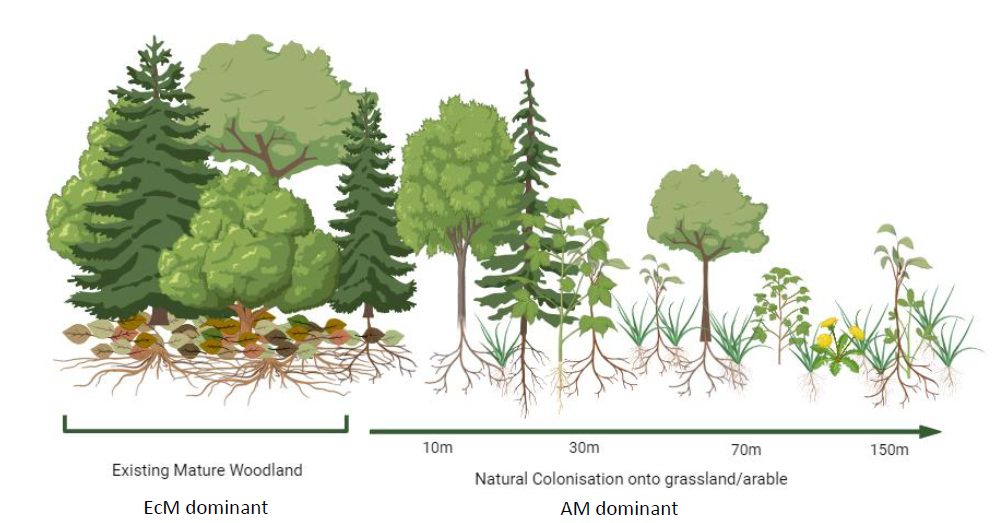Summary
Overview
This project aims to build a picture of mycorrhizal fungal communities at sites of natural colonisation, which is the development of woodland through natural processes of tree colonisation.
Using 9 natural colonisation sites across England ranging in age from 10 to over 60 years old, this project aims to assess how mycorrhizal fungal communities change and develop over the course of natural colonisation, offering insights into how mycorrhizal fungi may mediate tree colonisation and the process of succession from post-agricultural land into woodland.
Natural colonisation sites have been paired with nearby planted woodland sites of similar ages, and this will allow the comparison of these two modes of woodland creation to investigate differences in mycorrhizal fungal community including biodiversity and ecosystem function.
This project aims to further explore the process of dispersal and similarity in mycorrhizal fungal communities across spatial scale by investigating changes in communities and measuring spore dispersal at varying distances from adjacent mature woodland.
Together with additional research taking place over 23 Natural Colonisation sites, including plant communities, woodland structure and soil and carbon assessments, this project aims to fill the evidence gaps associated with natural colonisation as a means of woodland expansion.
This project is a collaboration between Forest Research (Dr Elena Vanguelova), Imperial College London and Kew Gardens (Dr Laura Martinez- Suz and Prof Martin Bidartondo and PhD student Rose Gooda).
This project is part of the Natural Colonisation workstream and funded by the Nature for Climate Fund.

Research Objectives
- To examine what fungi form mycorrhizas (ECM and AM) on roots of different naturally colonising trees, in comparison to potential soil inoculum from eDNA, addressing the question of how mycorrhizal fungi mediate tree colonisation.
- Is mycorrhization from soil inoculum of naturally-colonising trees more limited than for planted trees, and how it is related to measured soil chemical (pH, labile carbon and total carbon, nitrogen), physical (soil texture, bulk density) and biological parameters (e.g. soil bacterial, fungal and mesofauna communities) already measured at the sites.
- To study keystone spore-dispersed ECM/AM fungi that can mediate tree invasion and how are they related to aboveground tree species mixtures, tree size and density and tree growth.
Findings and Recommendations
In May, the 6-month report was submitted to supervisors and a panel of assessors at Imperial College London. This report included a literature review summarising the state of the field and identifying key questions, before proposing a detailed plan to survey 9 or more natural colonisation sites in England in the summer of 2024, and plans for further research.
In early June, an Early-Stage Assessment carried out by the panel was passed and research plans approved.
Latest Update
Fieldwork commenced in late June, completing sampling of the first of 9 sites to be carried out this summer. As of 30 August, 5 of the 9 sites have been sampled, and 9 sites are expected to be sampled by the first week of October. Soil processing is currently underway and is expected to be completed before January 2025.
Funding & Partners
- This project has been funded through the Government's ‘ Nature for Climate Fund’
-
 DEFRA
DEFRA -
Collaborating Partners
-
 Imperial College London
Imperial College London -
 Kew
Kew
